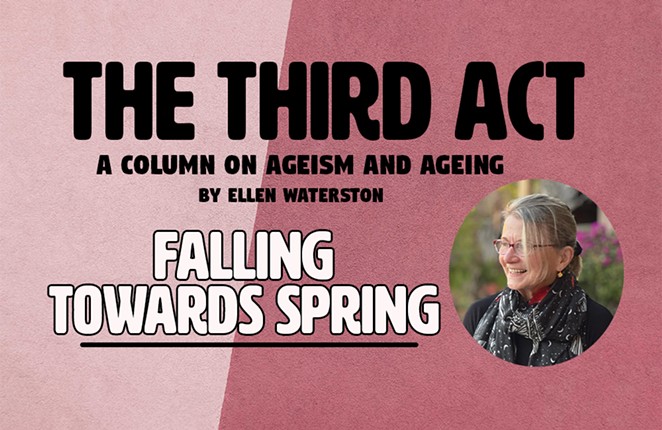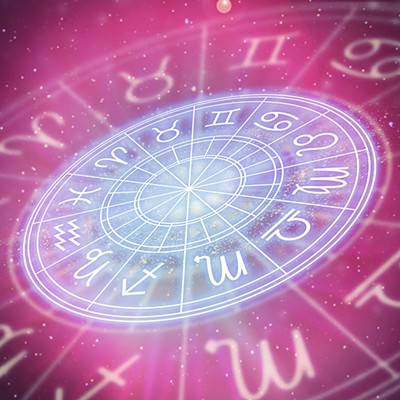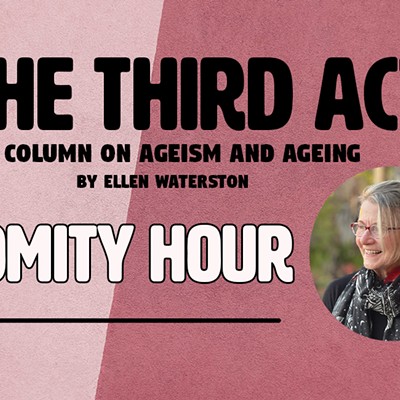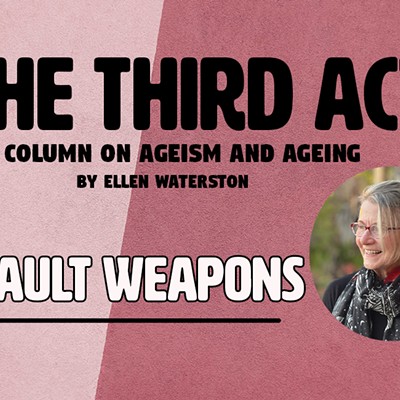Taking a spill wasn't a medical red flag when first learning to ride a two-wheel bike or, at 30, cartwheeling down the ski slope leaving a trail of goggles and skis. So, Boomers, when you commit a young person's fall, don't admit to your doc you tripped on a root while on a September hike. If you do, you'll be subjected to an ageist double standard, and forever more be considered a "fall risk."
That having said, it is true that the healing response after a certain age is slower, so best not to imitate Super- or Spider-man. And there's good reason to listen to internists' practical advice, like never hike with your hands in your pockets. Kind of like never squat with your spurs on. They might prescribe poles, a walking stick, a cane, even an all-terrain walker when frequent falling is an issue. And then there's the fact that once you're over 65, falls can signal that uninvited guests are crashing your life's party. Physical and mental conditions we never dreamt we were candidates for are part of the initiation into this venerated club called old age. Many of those conditions are signaled by stumbles. So, in a practical sense, the proactive diligence of medical professionals is worth its weight in gold.
But when the cause of the falls, literally or figuratively speaking, can't be fixed and won't go away, something other than practical solutions are needed. They're hard to embrace, especially given our cultural programming to figure things out, to make a plan and execute it, so all will be well. But some situations, whether physical, emotional, financial or circumstantial, just do not respond to logical problem solving. Then the only available "plan" is an illogical one: surrender. To paraphrase Phillip Simmons (1957-2002), author of "Learning to Fall," life is not a problem to be solved but a mystery to embrace.
For the doers and solvers that we are, surrender sounds scary or, at the very least, not practical, nonsensical — akin to letting go of the steering wheel while the car is moving. But as I say goodbye to friends facing death with extraordinary calm, dignity and courage, as I spend time with age mates living creatively and mightily with physical and medical challenges, as I consider my own seven decades and the world around me, Simmons' words ring true.
"At one time or another, each of us confronts an experience so powerful, bewildering, joyous, or terrifying that all our efforts to see it as a 'problem' are futile. Each of us is brought to the cliff's edge. At such moments we can either back away in bitterness or confusion, or leap forward into mystery." Diagnosed with ALS, or Lou Gehrig's disease, at age 35, Simmons states that his book's central theme is a paradox: "In the act of letting go of our lives, we return more fully to them."
Think of all the ways we can fall — out, over, or through. We can fall back (Hello, Daylight Saving Time on November 3!), fall for a joke, fall in love. And while we're in the midst of the fall, we can't possibly know the outcome. Like life itself. Simmons encourages us to, "Find victory in the falling, the not knowing." As to the inscrutability of life, to the unanswered questions that plague us, he reminds all we can do is love and be kind. It's what Jesuit priest and founder of Homeboy Industries Gregory Boyle calls radical forgiveness of self and other. It's hard work but maybe the only work.
Rainier Maria Rilke, writing in the 1900s to a young protégé in "Letters to a Young Poet," penned this antidote to life's unanswered questions: "I want to beg you, as much as I can, dear sir, to be patient toward all that is unsolved in your heart and to try to love the questions themselves like locked rooms and like books that are written in a very foreign tongue. Do not now seek the answers, which cannot be given you because you would not be able to live them. And the point is, to live everything. Live the questions now. Perhaps you will then gradually, without noticing it, live along some distant day into the answer."
September marks the beginning of another cycle of dying to life in this eons-old tumbling act. If you're a leaf falling from a tree in the autumn, what are you falling toward? I'd say spring. I'd say toward living everything.
—Poet and author Ellen Waterston is a woman of a certain age who resides in Bend. "The Third Act" is a series of columns on ageing and ageism.



























